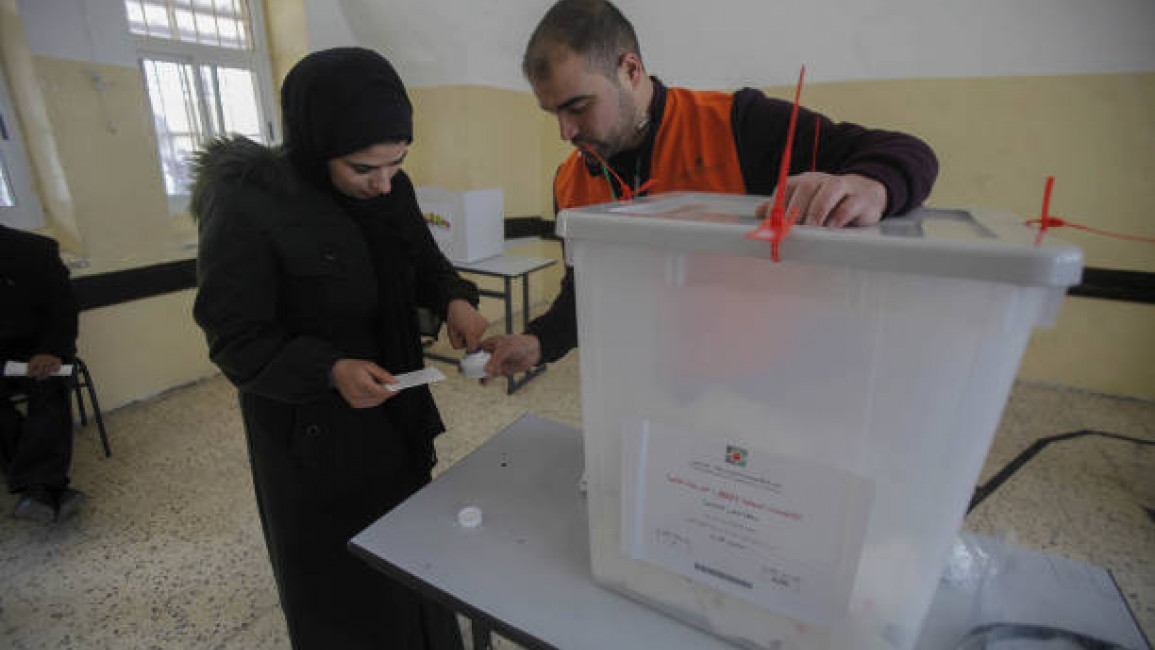'Independent' candidates make gains in West Bank local elections
Independent candidates dominated the Palestinian local elections, winning 64 percent of seats, up from just 37 percent five years ago, according to official results released on Sunday.
Palestinians’ participation rate in the West Bank municipal elections, which took place on Saturday was 53.7 percent, Hanna Nasser, president of the Central Election Commission, announced in a press conference late on Saturday in Ramallah.
Nasser said that more than 377,500 Palestinians cast their votes in some 50 cities and towns across the West Bank.
"Voting went on smoothly without any major irregularities recorded," he added.
Saturday marked the second phase of municipal elections. The first phase, which took place in December, included 153 municipal councils in areas 'C' and 'B', while the second phase included all main cities and governorates.
According to the Palestinian Central Elections Commission, voter turnout in yesterday's second round of local municipal elections was 53%. https://t.co/zhyudC25vN
— Dr. Yara Hawari د. يارا هواري (@yarahawari) March 27, 2022
Hamas officially boycotted Saturday's municipal elections and refused to hold elections in the Gaza Strip.
In the West Bank, however, some candidates in non-partisan lists are known for being close to Hamas, especially in major cities.
Palestinian president’s ruling Fatah party ran in all localities, in some cases with more than one list for the same local council, mainly competing against left-wing coalitions and independent candidates lists.
Attention was centred around the main 11 municipal councils of the West Bank’s major cities and governorate centres, in eight of which won independent and opposition lists, while Fatah-related lists won in the remaining three.
Fatah, however, declared a "crushing victory", in a statement published by the state-run Wafa agency.
Independent and opposition lists won in Hebron, Toulkarem, and Qalqilyah, where two non-partisan lists formed a majority coalition, which included members close to Hamas.
Independents also won in Al-Bireh, where the head of the winning list and mayor-elect, Islam Al-Tawil was arrested by Israeli forces last week, and in Bethlehem, where all 11 competing lists were non-partisan.
Fatah's lists won the majority in the strategic main cities of Ramallah, and Nablus, as well as in Jenin.
1/2Yesterday, the EU, along with many of its MS & like-minded, observed the 2nd round of Palestinian municipal elections as guests. Palestinians exercised their right to vote across many different locations and major cities in the West Bank. pic.twitter.com/pbkkKllmsx
— EU and Palestinians (@EUpalestinians) March 27, 2022
Following the announcement of results, dozens of Palestinians took to the streets in celebration, chanting political slogans, especially in the cities and towns where Fatah candidates won.
Fatah's vice-president, Mahmoud Al-Aloul, said in televised comments that his party achieved "a great and wonderful victory".
Fatah's central committee member and minister of civil affairs, Hussein al-Sheikh, announced in a tweet that his party won the majority of municipal councils, before the official announcement of results.
Preliminary results show #Fatah winning at most municipal councils #elections in the #West Bank. Congratulations to our people on this democratic wedding and congratulations to Fatah, the pioneer movement of the #Palestinian national struggle. https://t.co/tkMdvJXDQq
— حسين الشيخ Hussein Al Sheikh (@HusseinSheikhpl) March 26, 2022
"Municipalities have no political role, but Palestinians give them a lot of political significance," Abdul Rahman Ibrahim, political science professor at Birzeit University, told The New Arab.
"Before the Oslo accords and the creation of the Palestinian authority, municipal councils were the only spaces through which Palestinians could practice politics and oppose Israeli occupation policies," Ibrahim said.
"Palestinians continue to hold to this image of municipalities, and therefore they feel political about municipal elections."
Another reason for the politicisation of local elections, according to Ibrahim was "the lack of presidential and legislative elections, which makes people thirsty for any form of political participation".
What a complete farce. Palestinian President Mahmoud Abbas makes a public display of voting in the municipal elections and yet continues to rule years passed his elected term & without a democratic mandate. https://t.co/rgEuVKheaY
— Dr. Yara Hawari د. يارا هواري (@yarahawari) March 27, 2022
Ibrahim highlighted, however, that "municipal elections aren’t necessarily an indicator to political choices, because in many places there are family and personal alliances that play an important role, which is why we saw in some places two, or up to three lists related to Fatah competing for the same council".
Palestinians in the West Bank, Gaza and Jerusalem were scheduled to vote for a president and a legislative council in May 2021. Palestinian President Mahmoud Abbas called off the elections a month earlier.
The last Palestinian presidential elections took place in 2005, and the last legislative elections were held in 2006. Since then, municipal elections were held five times, the most recent in 2017.



